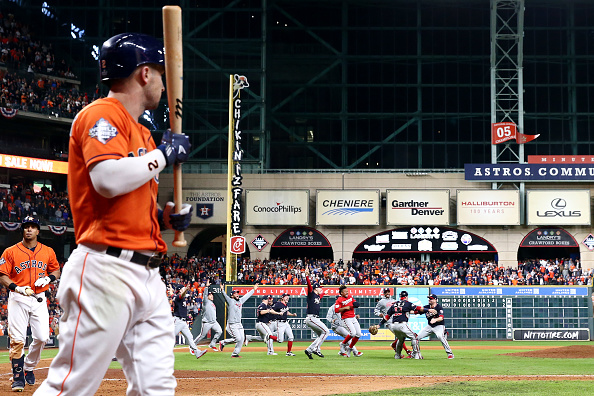MLB home-field advantage has been a hot topic of discussion, especially when it comes to post-season play. Interestingly enough, home-field has not been straightforward for years. From 1925 until 2003, the home-field advantage in the 2-3-2 format alternated. In even years, the National League (NL) was awarded home-field. Odd years were awarded to the American League (AL). From 1995-2002, the trend flipped due to the players’ strike, which would have resulted in back-to-back NL years. After the 2002 all-star game ended in a tie, the MLB ruled that home-field will be determined by whichever league won the all-star game from 2003-2017. Finally, since 2018, the team with the better record earns the right to host.
Now, that’s all just for the World Series. With all that hooplah, it must mean that having home-field advantage is important. Let’s take a closer look at the performances of home teams in the MLB post-season and whether or not it really makes a difference. For this, we will study the MLB home-field advantage for the last 20 seasons (2000-2019).
MLB Home-Field Advantage: Does It Really Matter?
NL Wild Card
Starting in 2012, the MLB post-season expanded to include one more Wild Card team. In order to do so, the two Wild Card teams face each other in a one-game playoff to earn the right to play the number one seed. Due to this, there is not nearly enough data to accurately extrapolate, though we will try anyway!
In the eight years of its existence, the home team has actually faltered in the big stage in this round. Anything can happen in one game. However, the home squad in the NL Wild Card round sports a losing 3-5 record without a single walk-off victory. It seems that home field at this stage is less important than hitting your stride as a team. Personally, I would call for a three-game series, not unlike what teams experience during the regular season. The playoffs are too big to bet all your chips on a single game where the ace is off, or a random bench player comes up clutch.
AL Wild Card
The AL Wild Card round is just the same as the NL, with only the Designated Hitter as the difference. It also seems that while the home team fared marginally better, the games are a bit more exciting. In its eight years, the home teams earned a 4-4 record with two walk-off victories. So far, it seems like the craze regarding MLB home-field advantage is not as strong as one would expect. To be fair, the one-game series are not the best at determining which team is truly better. Since 2000, only six Wild Card teams made the World Series. However, only two NL teams (2014 San Francisco Giants, 2019 Washington Nationals) have won it all after the MLB added the second Wild Card team. The only AL team to even make the World Series as a Wild Card were the 2014 Kansas City Royals. Those Royals, though fun to watch, ultimately lost.
NL Divisional Series
The next round of the MLB post-season is the divisional round and things don’t seem to be getting more decisive. In the last 20 post-seasons, the home team in the NLDS sports an 85-77 record. To be fair, there have been plenty of instances where the lower-seeded team sweeps the better-seeded team. In 2012, however, the Cincinnati Reds took the first two games of the series in San Francisco. Up 2-0, all they needed to do was win one game when the series came back to Great American Ballpark. They did not, so home teams wen 0-5 in that series. On the other end of the spectrum was the 2011 NLDS between the Milwaukee Brewers and Arizona Diamondbacks. The best-of-five series went all five and each game was won by the home team.
While an 85-77 record may not blow anyone away, it is still a majority. Not to mention the fact that, in 20 years, eleven games ended via a walk-off win. It should be noted, however, that during the 2012 post-season, the home-away format was 2-3, where the higher-seeded team travels for the first two games. This could have something to do with a lower percentage, considering the above Cincinnati example.
AL Divisional Series
On the other side of the bracket, the AL’s version of the MLB home-field advantage is just as even. In its 20 years, home teams earned an 81-78 record. To put it lightly, that mark is not great. It would only take one upset in 2020 to flip the script. All in all, perhaps this poor record is due to a vast difference in talent between the teams participating. Despite the sub-par record, games are a bit more exciting than their NL counterparts. On 14 occasions, the home team won off of a walk-off. Maybe having a DH does lead to more exciting ball games.
In 2010, one of the matchups resulted in sadness for home fans. The series between the Texas Rangers and Tampa Bay Rays ended with a 0-5 mark for the home sides. Each team had a chance to bring it home and win on their own turf, but neither prevailed. However, in the most recent iteration of the playoffs, the Houston Astros and Rays split a 5-0 mark at home. Now, this mark could be tainted due to the recent findings of sign-stealing.
NL Championship Series
While the NLDS mark was almost .500, the NLCS has started to give some support to the importance of MLB home-field advantage. Could the increased mark be due to the fact that the championship series are best-of-seven? Well, a 64-48 record certainly attests to the idea. While there have been some 4-0 sweeps in the last 20 years, there has not been a 7-0 home mark from an NL squad. That is not to say that these matchups are without drama. In 20 years, 13 games ended with walk-off heroics.
The difference of 16 games shows that while it may not be an overwhelming correlation, there is certainly something to be said about some good old fashioned MLB home-field advantage. Perhaps the AL will have a better home-field showing.
AL Championship Series
So is the AL any better at home compared to the NL? Short answer: no. In 20 series, the home team has an impressively similar record at 65-48. It is kind of interesting if you think about it. Both leagues sit at similar records at home but play very different games. The one area where the AL did get the better of the NL is in the area of walk-offs. Since 2000, 15 games ended thanks to a walk-off.
We were treated to history in 2017, however. In the ALCS between the Astros and New York Yankees, the home team won every game, which gave the Astros their first AL pennant and vaulted them to a World Series championship. This was the first time in the ALCS history that the home team won every game. This had happened only four times previously in a best-of-seven series (World Series: 1987, 1991, 2001, NLCS: 2004).
World Series
The World Series is where the idea of MLB home-field advantage comes to fruition. This is the final match-up in the season and it’s crucial due to the different leagues’ styles of play. In total, the home team put up a 64-49 record with 11 walk-off victories. As stated above, the 2001 World Series featured a seven-game series where the home team won each game. This past year, however, the home team failed to secure a single victory. This was the first-ever time in a major American final where the away team took every game.
The home totals show that the AL has a slight edge. With a 34-21 home record versus the NL’s 31-27 mark, it’s impressive that both leagues have won 10 titles in 20 years. When you subtract this past year’s 0-7 mark, the 34-17 mark the AL holds looks a lot better. So, does there exist a true MLB home-field advantage? The data says yes, but it’s not as important as it seems until you get to the World Series. I’d be willing to bet that this disparity would even out if/when the NL adopts the DH. Either way, the home team has a better chance of winning. Although, when it gets to the nitty-gritty, the better team will win.
No Place Like Home?
Despite declining attendance in some markets, gameday at an MLB park is one of the greatest experiences our country can offer. The reason we looked at post-season and not the entire season is simple: the number would end up skewed thanks to certain historically bad teams. At least with the playoffs, the five-best teams from each league battle it out. Now that you are armed with this knowledge, take a closer look at the matchups and results when the 2020 MLB playoffs eventually get underway.
Notable home records during respective post-season runs:
2002 Los Angeles Angels of Anaheim: 8-1
2007 Boston Red Sox: 7-1
2009 Philadelphia Phillies: 7-0
2009 New York Yankees: 7-1
2015 Kansas City Royals: 7-1
2017 New York Yankees: 6-0
2017 Houston Astros: 8-1
Breakdown Of Home Records Of Each Franchise
| NL | AL | ||||
| Team | Win % (Record) | Walkoffs | Team | Win % (Record) | Walkoffs |
| SF | 0.649 (24-13) | 5 | KC | 0.813 (13-3) | 2 |
| MIL | 0.643 (9-5) | 2 | BOS | 0.651 (28-15) | 8 |
| PHI | 0.640 (16-9) | 2 | HOU | 0.615 (16-10) | 4 |
| ARI | 0.632 (12-7) | 1 | DET | 0.615 (16-10) | 2 |
| MIA | 0.625 (5-3) | 2 | CLE | 0.600 (12-8) | 2 |
| STL | 0.591 (39-27) | 6 | CHW | 0.600 (6-4) | 1 |
| NYM | 0.591 (13-9) | 1 | NYY | 0.595 (44-30) | 9 |
| LAD | 0.568 (25-19) | 4 | TOR | 0.545 (6-5) | 2 |
| HOU | 0.455 (5-6) | 2 | LAA | 0.519 (14-13) | 1 |
| ATL | 0.407 (11-16) | 2 | BAL | 0.500 (3-3) | 0 |
| CHC | 0. 407 (11-16) | 0 | SEA | 0.500 (3-3) | 1 |
| PIT | 0.400 (2-3) | 0 | TB | 0.471 (8-9) | 2 |
| COL | 0.375 (3-5) | 0 | TEX | 0.389 (7-11) | 1 |
| WAS | 0.368 (7-12) | 1 | OAK | 0.381 (8-13) | 3 |
| CIN | 0.000 (0-4) | 0 | MIN | 0.143 (2-12) | 0 |
| SD | 0.000 (0-3) | 0 |
Main Photo:
Embed from Getty Images



